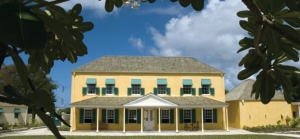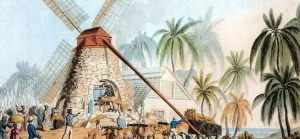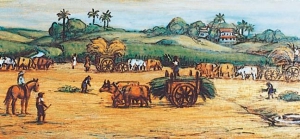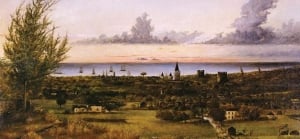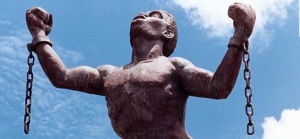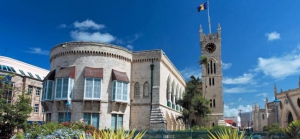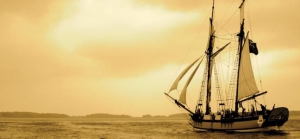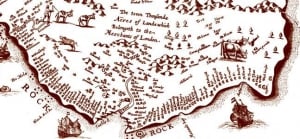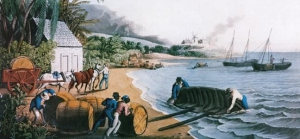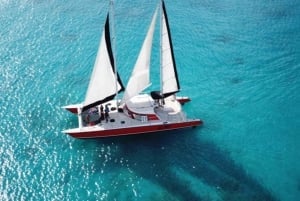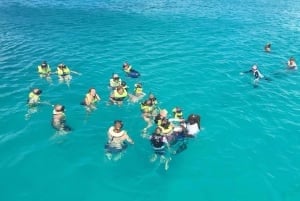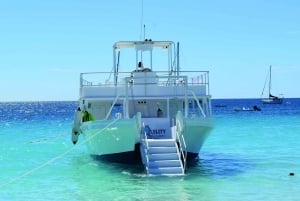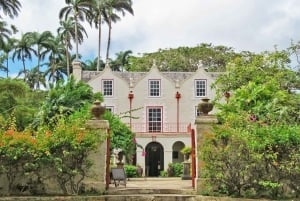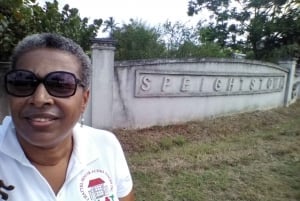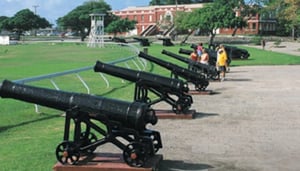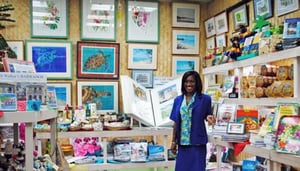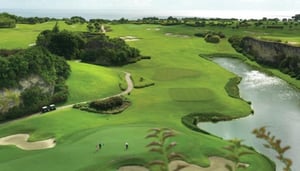Barbados History
Barbados has always had a fascinating history but there can be little doubt that significantly more people today are interested in, and knowledgeable about, this intriguing country’s colourful past than would have been the case twenty-five years ago. The hunger of a maturing independent nation to learn more about itself, combined with the evolution of heritage tourism and a greater supply of easily accessible information, have unearthed a plethora of remarkable facts and stories about Barbados. In turn, this upsurge in historical fascination has instigated the opening of an ever-growing number of museums, galleries and heritage sites. In essence, Barbados’ rich history has created a solid platform for a healthy future.
The first people to call Barbados home were the Amerindians, who reached the island around 1623 BC. They came here by open canoe from the Orinoco area of South America, known today as Venezuela. During the next 3,000 years, several tribes inhabited Barbados at varying intervals, including the Caribs and the Arawaks. The Caribs were a warlike tribe and it was from their name that the word Caribbean was derived. The Arawaks, a peace-loving community of farmers and fishermen, lived mainly on the coast and they established major settlements in areas like Bridgetown, Heywoods and Chancery Lane, where archaeological digs have unearthed evidence of their existence. The hammock and the barbeque are good examples of how we retain elements of the Arawak traditional way of life. These are both Amerindian words, as is ‘huracan’, a less welcome feature of life in the Caribbean. The Arawaks also had a ritual of impaling pineapples on two poles either side of the doorway into their homes, believing that this kept away evil spirits. This ritual was mimicked by the settlers, and today there are many gateposts with a pineapple design standing on the top, not only in Barbados but throughout the world.
The first Europeans to set foot on Barbados were the Spanish in the early 1500s. They chose not to settle here but they did take Amerindians as slaves to work in Hispaniola. This seems to have driven the Indians away, since the Portuguese found the island deserted when they first landed in 1536. Like the Spanish, they did not establish any settlement and simply used the island as a place to replenish their water and food supplies.
The word Barbados was first seen on a world map of 1529. The linguistics of the name and the timing of its appearance suggest that it is of Spanish origin. In Spanish 'barbado' means to have a beard, and 'Los Barbados' translates to 'The Bearded Ones'. Traditional folklore relates this to The Bearded Fig Tree, with its aerial roots reminiscent of a Spanish nobleman's long beard. Another theory contends that the name refers to actual bearded men, who could have been early African explorers or their offspring through unions with the Amerindians. In any event, by 1625 when an English ship stumbled across Barbados by virtue of the navigational miscalculations of its captain, Henry Powell, the island had a name but no inhabitants.
For the English the island represented a golden opportunity to acquire a colony with good potential for agriculture, with a favourable climate and rich soils. So, having put ashore at the site of today’s Holetown, they promptly claimed the island in the name of the Crown and left to return at a later date. This they did in 1627 when Powell brought with him 80 settlers and a number of slaves captured en-route from a trading vessel.
These early pioneers set about the task of clearing the densely wooded land and planting tropical crops such as cotton, tobacco, yams and cassava, thus instigating a long period of English rule that was to last some 339 years and gain the island the sobriquet ‘Little England.’
Life was extremely difficult for these first pioneers, trying to grow strange crops in conditions totally alien to what they had left behind. Their efforts proved to be inadequate and they soon had to be supplemented by the introduction of white indentured servants. The period of indenture was usually 4 to 7 years hard labour, with a promise of freedom and land at the end if the individual survived. As it was not in the financial interest of the farmers for their indentured servants to survive, not many did.
The early farming was not successful and, needing to find a more suitable crop, the Barbadians sought the assistance and advice of their friendly rivals, the Dutch. Thus it was that in 1637 they imported sugar cane plants from Brazil; a move that was to shape the future of Barbados for centuries ahead. The climate and geology of Barbados provided ideal growing conditions for sugar cane and the planters and landowners prospered, especially as the value of land rocketed. Recognising the need to protect their own increasingly valuable interests, the islanders set up a House of Assembly in 1639, thereby establishing the third oldest parliament in the world and building a very early and strong foundation for a long future of Barbadian democracy and political stability.
The sugar industry boomed from the time that sugar was exported to England, in 1645, and in order to supplement the inadequate work force of white British indentured servants, it was decided to bring in black slaves from Africa. The presence of this unjustly acquired free labour and the excellent growing and market conditions combined to provide the plantation owners with vast profits. At least, as most were resident owners, much of their great wealth remained in Barbados and that money was used to build an excellent infrastructure. Some of the very finest plantation great houses in Barbados were built. Drax Hall and St. Nicholas Abbey date back to about 1653 and 1658 respectively, making them two of the three oldest surviving Jacobean mansions to be found anywhere in the Western Hemisphere.
In 1660, just a mere 33 years after settlement, Barbadian investors formed "The Society of Barbadian Adventurers" and set off for America in search of greater opportunities. This group of intrepid Barbadians was instrumental in establishing colonies in what is now Wilmington, North Carolina, as well as in Charlotte, South Carolina, and in settling the Carolinas as a whole. Several of the earliest Governors of the Carolinas were Barbadians. Similar Barbadian settlements were established in the areas of New York, Pennsylvania and Virginia.
As the profits from the sugar industry increased, then so did the importance of Barbados. The island was valued as a military headquarters and a vital link in the growing trade between Europe and the New World.
Thus in the 1700s, Barbados began to be populated by higher calibre, better educated people whose perceptions and social concerns differed greatly to the early pioneers. In effect Barbados became more refined. Soon the Society of the propogation of the Gospel in Foreign Parts came to Barbados and promoted the revolutionary doctrine that slaves deserved to be introduced to Christianity and given an education. The planters were outraged and opposed the move entirely. However, a wealthy landowner, Christopher Codrington, left his entire property to this cause. Codrington, who had been educated at Oxford University and served as a general in the English Army, deserves enormous credit for being so progressive at a time when he would have been vilified by his peers. As a result of his benevolence, Codrington College, the island's first place of higher learning, was opened in 1710. It still operates today.
George Washington, the future first President and ‘Founding Father’ of the United States, visited Barbados in 1751 as a 19-year old during his only ever trip outside America. He came here to accompany his sick brother, Lawrence. In those days Barbados was well known as a leading spa and health care centre.
In fact, at this time, Barbados was more advanced than America, and the young Washington must have been greatly influenced by all that he witnessed. Bridgetown was the biggest city and busiest port he had ever seen; he went to the theatre for the first time; Barbados had one of the world's most advanced agro-economies; he met leading scientists and engineers; he observed British military training at the Garrison; he met Scottish rebels who had fought the British; and he developed a relish for lavish banquets and fine dining. It was also reported that while he was here he read a copy of The Charter of Barbados and it so impressed him that he later used it as a basis for writing the articles of the Constitution of the United States of America.
While in Barbados, George Washington contracted smallpox, but survived with the help of a British doctor. This gave him an immunity against the virus and later helped him to survive the lethal outbreak of smallpox which decoimated his army during the American War of Independence, enabling him to take his place in history as one of the greatest ever Americans.
The original house where Washington stayed in Barbados has been restored as George Washington House.
As mankind’s social and moral perspectives developed for the better, it became increasingly apparent that slavery was an evil institution that needed to be disbanded. In 1807 the English took the initiative for the world by abolishing the slave trade and this later induced the plantation owners to dismantle the system. The abolition of slavery was finally realised in Barbados in 1834, some 29 years earlier than the United States.
Most slaves stayed on the plantations and saw little change in their lives, but some did leave and helped to create a new middle-class. Out of these ranks emerged Samuel Jackman Prescod, who in 1843 became the first non-white member of the House of Assembly. At this time improvements were made in the health and education systems and the right to vote was given to anybody earning 50 pounds sterling per annum. In a very enlightened move in 1847, Barbados passed an Act to establish a Public Library for free use by all. This was a social advancement that pre-dated any similar Act in Britain by some three years. Nevertheless, inequalities persisted and there was still a great deal of dissatisfaction amongst the masses of the people. Freedom was priceless but times were still very hard.
From about 1850, many Barbadians left the island in search of better wages. Some 30,000 went to work on the building of the Panama Canal between 1904-1914. Many Barbadians stayed in Panama or settled in places like Cuba, the USA or Canada, but those who returned did so with the money that they had saved. They were able to buy land and as landowners they had the right to vote. This new group of voters helped to re-shape the political landscape of Barbados for ever.
The world depression of the 1930’s took a heavy toll on Barbados and widespread unemployment hit the people hard, further fuelling the flames of discontent that finally erupted in the form of the 1937 riots. From out of this melee of social turmoil there appeared a new group of black leaders, highly educated men, who were destined and determined to win equality for their people.
The Barbados Progressive League under the leadership of Grantley Adams and Hugh Springer, both later to be knighted, doggedly set about winning "a living wage for all workers." In time the League adopted the title of the Barbados Labour Party (B.L.P.) and finally gained their just reward when they won the 1947 General Election. Three years later universal suffrage was at last a reality and the long, hard fight was won after a battle of some 117 years.
Rival factions within the B.L.P. eventually led to a split in the ranks and this in turn initiated the formation of the Democratic Labour Party (D.L.P.). The B.L.P. and the D.L.P. have been the two main political parties in Barbados ever since.
Barbados gained independence from Britain on the 30th November 1966, under the leadership of the late Errol Walton Barrow of the D.L.P. In our forty-two years as a proudly independent nation, Barbados has made steady progress under the leadership of both D.L.P. and B.L.P. governments.
In an island so small with a population of over 286,000 it has always been necessary to make the most of any given situation. The limited land available has been intensively cultivated and divided into a neat, patchwork pattern of fields, clearly visible from the air. Areas for housing have been used imaginatively and efficiently. There is no wasted space. Out of this constrained environment have evolved people who are, by both nature and necessity productive, talented, creative, self-disciplined, intelligent, confident, proud and happy. This island, no larger than a small town in most countries, has supplied the world with a phenomenal array of scholars, artisits, musicians, sportsmen and professionals in every walk of life.
Today's Barbadian can look back gratefully upon the efforts of his forefathers and draw confidence from their accomplishments - regardless of ethnic background each individual is now in a position to state "I am a proud Barbadian".
Sugar remains the island's main agricultural product, however, a decrease in the world demand has forced farmers to diversify in search of alternative crops and better markets. Sea Island cotton, tropical flowers, market and livestock farming have all increased as a result. Tourism is the backbone of the economy today, followed closely by the international business sector, financial services and communications technology. The island also produces about 60% of its oil requirements.
Fifty two years after gaining independence, Barbados remains justly able to boast about its political stability and quality of life. It is a land where healthy existence is readily available to all - body warming sunshine, fresh breezes and sufficient rainfall to both top up the underground supply of pure drinking water and enrich the soils; a year-round local supply of fresh fruits and vegetables, poultry, meats and fish; an outfoors, exercise-oriented lifestyle and a positive attitude toward play. It is no wonder Barbados has such a high proportion of centenarians!


